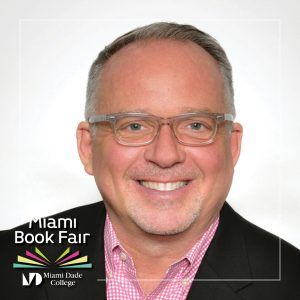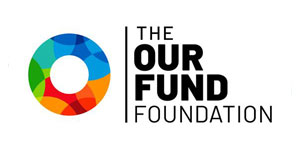
Originally from Cleveland, David Jobin, CEO and president of The Our Fund Foundation, was living in Washington, D.C., when he and his husband, Angel Burgos, decided to pull up stakes and settle in South Florida 10 years ago. In 2022 the foundation sponsored An Evening With Harvey Fierstein; last year it supported a session featuring John Freeman speaking with Andrew Holleran and Kyle Dillon Hertz, as well as our LGBTQ+ author programming in general.

What compelled Our Fund’s interest in Miami Book Fair – how does our work support your organization’s community-building and philanthropic goals?
We always say we exist to make South Florida the most liveable and thriving place in the country for LGBTQ+ people. And when we say the word “thriving” I think we always think about arts and culture. The cultural and educational opportunities afforded by Miami Book Fair really intersect with what we’re trying to achieve in the community.
Tell me about Our Fund – how and why did it come to be and what is your mission?
We’re a community foundation within a community. There are a handful of LGBTQ+ community foundations around the country, and our founders 14 years ago realized that there is a real concentration of LGBTQ+ wealth here in South Florida – how do we capture that to put it to work for future generations? We’re largely talking about a childless population, one less likely to have had families and children at a younger age, so I feel like we provide a solution for them. They’re thinking about everything they’ve worked for in life and how they can make sure that what they leave behind reflects the values by which they lived their lives. Our Fund allows them to do that.
A legacy that’s genuine.
Right.
How does MBF’s work align with your personal thoughts on access to literary culture?
We’re living in a time right now, particularly in Florida, where that’s an important question to ask. We’re seeing books being banned, we’re seeing censorship of LGBTQ+ materials, and I feel like keeping our stories alive and our literature out in the general community is essential. And you’d like to think that public libraries and schools are the places to do that, but we’ve learned the lesson that we need (other) partners in this.
Creating connection through cultural arts can be an effective tool in fostering empathy and understanding and opening up dialogues between wildly different groups – what are your thoughts on that?
You know, this question so closely mirrors the request for proposal that we do for arts and cultural funding, because we talk about how to create empathy and understanding in the general population through the arts. My background is in arts and culture, and I’m a huge champion of using them to get people to think about topics they might not otherwise encounter. Like gay men’s choruses, for example – it’s great that they get gay people to come and watch them but what they really need are general population audiences, to start changing people’s minds around presuppositions or biases they may have about LGBTQ+ people. Culture is the way that we do that.
Miami Book Fair has always presented LGBTQ+ authors; we wanted to amplify that even more and that’s where our support can help.
Were you able to attend the Fair last November?
I was out of town so I couldn’t, but I was there the year before for Harvey Fierstein, of course. The session was exactly what we wanted and we had a number of our supporters in the audience, and a lot of supporters in the audience for the Billy Porter session, too.
What most resonated with you from Harvey’s session?
I think because of the characters he’s played and the roles he’s drawn to that he can come off as a little aloof and uncaring. But he is just such a warm person – you could tell from the interview – and what I remember most about what he said is that for older LGBTQ+ people, we sometimes wrestle with how to understand and get behind the transgender movement, which is becoming more and more important in the LGBTQ+ space. And he put it into context; he came out during the HIV/AIDS era, and that was the driving force behind the LGBTQ+ movement at the time. He said he’s learned that you have to respect every generation that comes behind you and what their priorities are. And if this generation’s priority is transgender rights, then he has to understand that he’s not leading the fight anymore – and that if this is their priority, it’s his priority. It just gave me a whole new perspective on how movements change and adapt and adjust, and reminded me that you can’t hold onto the past.
Switching gears, what’s on your nightstand right now?
I’m reading The Kingdom of Sand by Andrew Holleran. He’s one of the leading voices in LGBTQ+ literature, and he’s still writing and still so vital.
If you could sit down with any author of your choosing, living or dead, who would they be and what would you ask them?
Truman Capote, and not because I really love him – I think it would probably be a really horrible lunch [laughs] – but because I really want to know if he ghostwrote To Kill a Mockingbird. I just can’t believe that someone could have one great novel in them like that and then nothing.
Interview by Elisa Chemayne Agostinho; responses have been edited for space and clarity.